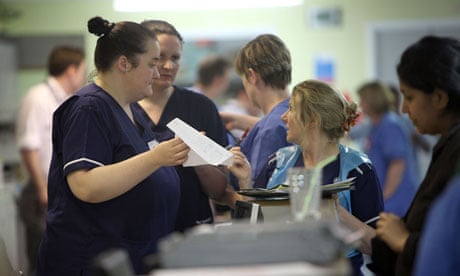Nurses will have to spend up to a year helping patients eat, wash and get dressed – work usually done by healthcare assistants – under government plans to shake up NHS care in response to the Mid Staffordshire hospital scandal that left between 400 and 1,200 to die as a result of poor care.
Any would-be nurse who refuses to undertake such hands-on work will be denied NHS funding for their degree, which is worth about £40,000 over three years and relied upon by almost all the 20,000 new student nurses a year. In effect they will be debarred from training.
Jeremy Hunt, the health secretary, is expected to announce the move on Tuesday when he sets out the government's response to Robert Francis QC's report into the scandal.
At the moment the basic tasks of caring for patients, which also include helping them get out of bed and going to the toilet, are mainly done by healthcare assistants or health support workers, who are paid much less than nurses and do not have their status.
Ministers see the move as essential to ensuring the nursing profession rediscovers the values of compassionate care which critics claim has been lost amid pressure to meet NHS targets, rising numbers of patients and some nurses displaying appalling behaviour towards some patients. Critics also fear that too many nurses have become too detached from the fundamentals of patient care and avoid too much routine contact with patients, such as help with feeding and moving around for those who need it.
Hunt will tell parliament on Tuesday what the coalition intends to do to overhaul many aspects of NHS care given Francis's damning criticisms of the "NHS system" and its self-interested "culture" which did not give enough priority to giving patients the best possible care.
Ministers, civil servants and NHS chiefs have spent seven weeks studying the 290 recommendations made by Francis following his 31-month public inquiry into why such inadequate care at Stafford hospital was allowed to continue for so long.
"Frontline, hands-on caring experience and values need to be equal with academic training. These measures are about recruiting all staff with the right values and giving them the training they need to do their job properly, so that patients are treated with compassion," Hunt said.
In a speech last November he castigated some NHS staff for their involvement in cases of patient care which he said had included "contempt" and "a kind of normalisation of cruelty".
The Royal College of Nursing, which represents most nurses and student nurses, may not welcome new entrants to the profession having to perform tasks usually done by colleagues who are less well-trained and not strictly part of the clinical workforce, either before or during their training. They may see it as an unwanted blurring of the dividing lines between two groups of NHS staff and even as demeaning to nurses.
Hunt's initiative follows an almost identical suggestion made by Francis. Recommendation 187 in his report said: "There should be a national entry level requirement that student nurses spend a minimum period of time, at least three months, working on the direct care of patients under the supervision of a registered nurse. Such experience should include direct care of patients, ideally including the elderly, and involve hands-on physical care."
He recommended: "Satisfactory completion of this direct care experience should be a pre-condition to continuation in nurse training. Supervised work of this type as a healthcare support worker should be allowed to count as an equivalent."
The change will be piloted before being made routine in England, Department of Health (DoH) sources said. Ministers will consider making other health professionals, notably health professionals such as physiotherapists, but not doctors, do the same as student nurses, depending on what those trials show.
Hunt will on Tuesday also publish new minimum training standards and a code of conduct for support workers in health and social care, following concerns that some lack the skills needed. They will include what DoH sources described as "clear requirements on behaviour and attitude". The standards will include training them in handling complaints from patients and relatives, reporting errors they have made or seen, recognising when a patient is undernourished or dehydrated, and talking properly to patients.










Comments (…)
Sign in or create your Guardian account to join the discussion